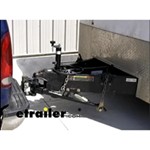
Is the Tongue Weight Listed on the Trailer Based on Dry Weight or GVWR
Question:
We are looking at a trailer that has a tongue weight rating of 440 lb. We would like to know if this is based on a fully loaded trailer GVWR or based on an empty trailer. Would this rating include the propane tanks and battery? We have a class III hitch which has a rating of 500 lbs, so we are close to the limit and would like to be sure we have a bit of safety margin. Thanks
asked by: Howard
Expert Reply:
Typically the tongue weight listed on a trailer is the dry, or empty tongue weight. Tongue weight varies not only by how much stuff you have loaded in the trailer, but where it is positioned. You can add 200 pounds of cargo to a trailer and get the tongue weight to go down. It just depends on how the load is situated. It may include the battery if it is a factory installed battery. If the trailer came with propane tanks, again it may take into account the empty tank, but not a full tank.
The propane tanks on a camper or travel trailer are usually right on the tongue and hold 20 pounds of liquid propane. Most of that would translate into tongue weight, so with just the propane added, your tongue weight would probably be at 480 pounds.
You may have the option of using a weight distribution system, depending on the vehicle and hitch, that will increase the weight capacities of the hitch by spreading some of the tongue weight further up the vehicle. I have added a link to a Weight Distribution Info page.
If weight distribution is something that could work for you, write back with the year, make and model of your vehicle as well as the hitch part number. Also, let me know the GVWR of the trailer. The GVWR is the most the trailer can weigh when fully loaded. In other words, the empty trailer weight combined with the weight off all the stuff you put in it, food, water, propane, clothes etc.




